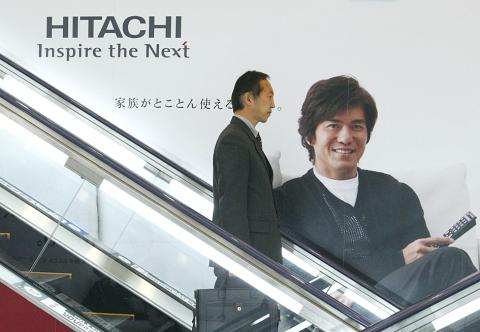Hon Hai Precision Industry Co (鴻海精密) shares gained in early Taipei trading after a Nikkei Shimbun report that the world’s largest contract manufacturing service firm for electronics and communication products plans to acquire control of a LCD venture between Japan’s Hitachi Ltd and Canon Inc for ¥100 billion (US$1.2 billion).
The stock advanced 0.4 percent to NT$117.50 as of 9:04am. The stock ended unchanged at NT$117 yesterday.
The companies are in final negotiations for Hon Hai to acquire ¥50 billion in each of two private offerings from the venture over the next two years, dropping Hitachi’s stake to 30 percent from 75.1 percent, according to the report.

PHOTO: REUTERS
The unit, Hitachi Displays, will use the funds to build a plant in Japan that will start operations in 2012, doubling the unit’s capacity, the report said.
Edmund Ding (丁祈安), a spokesman for Hon Hai Precision -Industry Co, did not -immediately answer calls to his mobile phone.
Hitachi declined to confirm the report on its subsidiary, with a spokeswoman saying: “The company is seeking measures to strengthen its operations.”
When the market share of Hitachi Displays and Chimei are combined, they controlled 17.3 percent of the world’s small and medium-size LCD panel market last year, beating the top-ranked Sharp Corp of Japan, which has a 16.5 percent share, the Nikkei said.

‘SWASTICAR’: Tesla CEO Elon Musk’s close association with Donald Trump has prompted opponents to brand him a ‘Nazi’ and resulted in a dramatic drop in sales Demonstrators descended on Tesla Inc dealerships across the US, and in Europe and Canada on Saturday to protest company chief Elon Musk, who has amassed extraordinary power as a top adviser to US President Donald Trump. Waving signs with messages such as “Musk is stealing our money” and “Reclaim our country,” the protests largely took place peacefully following fiery episodes of vandalism on Tesla vehicles, dealerships and other facilities in recent weeks that US officials have denounced as terrorism. Hundreds rallied on Saturday outside the Tesla dealership in Manhattan. Some blasted Musk, the world’s richest man, while others demanded the shuttering of his

Taiwan’s official purchasing managers’ index (PMI) last month rose 0.2 percentage points to 54.2, in a second consecutive month of expansion, thanks to front-loading demand intended to avoid potential US tariff hikes, the Chung-Hua Institution for Economic Research (CIER, 中華經濟研究院) said yesterday. While short-term demand appeared robust, uncertainties rose due to US President Donald Trump’s unpredictable trade policy, CIER president Lien Hsien-ming (連賢明) told a news conference in Taipei. Taiwan’s economy this year would be characterized by high-level fluctuations and the volatility would be wilder than most expect, Lien said Demand for electronics, particularly semiconductors, continues to benefit from US technology giants’ effort

ADVERSARIES: The new list includes 11 entities in China and one in Taiwan, which is a local branch of Chinese cloud computing firm Inspur Group The US added dozens of entities to a trade blacklist on Tuesday, the US Department of Commerce said, in part to disrupt Beijing’s artificial intelligence (AI) and advanced computing capabilities. The action affects 80 entities from countries including China, the United Arab Emirates and Iran, with the commerce department citing their “activities contrary to US national security and foreign policy.” Those added to the “entity list” are restricted from obtaining US items and technologies without government authorization. “We will not allow adversaries to exploit American technology to bolster their own militaries and threaten American lives,” US Secretary of Commerce Howard Lutnick said. The entities

Minister of Finance Chuang Tsui-yun (莊翠雲) yesterday told lawmakers that she “would not speculate,” but a “response plan” has been prepared in case Taiwan is targeted by US President Donald Trump’s reciprocal tariffs, which are to be announced on Wednesday next week. The Trump administration, including US Secretary of the Treasury Scott Bessent, has said that much of the proposed reciprocal tariffs would focus on the 15 countries that have the highest trade surpluses with the US. Bessent has referred to those countries as the “dirty 15,” but has not named them. Last year, Taiwan’s US$73.9 billion trade surplus with the US